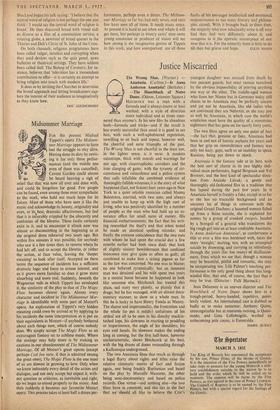Midsummer Marriage
FOR the present Michael Tippett's opera The Midsum- mer Marriage appears to have lost the struggle to stay alive. Having done its duty by reviv- ing it for only three perfor- mances (and the middle one even of those was cancelled),
Covent Garden could almost
ew be heard heaving a sigh of relief that that was now all over and done with, and could be forgotten for good. Few people can be found, even among those most sympathetic to the work, who hold out much hope for its future. Most of those who have seen it like the music and acknowledge its beauty, originality and even, at its o best, dramatic effectiveness, but feel that it is incurably crippled by the obscurity and confusion of the libretto. These faults certainly exist in it, and to encounter it afresh now was almost as disconcerting in the beginning as at the original dress rehearsal two years ago. But within five minutes it was possible, for anybody who saw it a few times then, to resume where he had left off, and to accept the libretto, or rather the action, at face value, leaving the 'deeper meaning' to look after itself. Accepted on these terms the sequence of incidents has a sufficient dramatic logic and force to arouse interest, and as it grows more familiar so does it grow more absorbing and more real. Suddenly, beneath the Wagnerian veils in which Tippett has enveloped it, the similarity of the play to that of The Magic Flute becomes clearer again. Almost every character and incident in The Midsummer Mar- riage is identifiable with some part of Mozart's opera. An explanation of Tippett's very hidden meaning could even be arrived at by applying to his incidents the same interpretation as is put on • their equivalents in Mozart—if anybody bothered about such things now, which of course nobody does. We simply accept The Magic Flute as an extravagant fantasy set to sublime music. Where the analogy may help more is by making us cautious in our abandonment of The Midsummer Marriage. Of all Mozart's great operas (except perhaps Cost fan tutte, if that is admitted among the great ones), The Magic Flute is the one most of us are slowest in growing to love. Only when we know intimately every detail of the action and dialogue, and not only accept but expect it, with- out question or criticism, as inevitable and right, do we begin, to attend properly to the music. And then suddenly it becomes our favourite Mozart opera. This process takes at least half a dozen per-
formances, perhaps even a dozen. The Midsum- mer Marriage so far has had only seven, and very few have seen all of those. It needs many more. At present it is hard to see when and where it will get them, but perhaps in twenty years' time some young conductor or producer of vision will see how strong is the imaginative genius of Tippett in this work, and how unimportant are all those faults of his too-eager intellectual and emotional responsiveness to too many literary and philoso- phic stimuli. With it brought back to them then, the majority who now reluctantly write it off may find they feel very differently about it, and recognise in it the operatic masterpiece of our time that it is. For the minority there is little to do
till then but grieve and hope. COLIN MASON


































 Previous page
Previous page